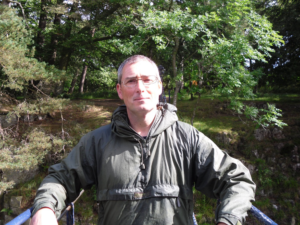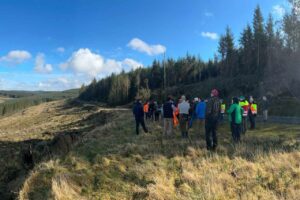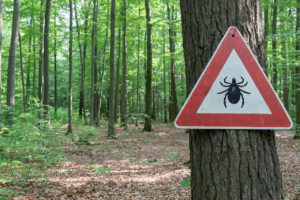
Chartered Forester Jim Reilly MICFor, PhD student at the University of Aberdeen, explains food security.
What is security?
Food security is a complex subject and it is perhaps helpful if we start by considering what is meant by security. Security can be a disputed concept, because it means different things to different people. However, one thing that we can all agree on is that security is about the protection of an object (a person or thing depending on your interpretation). I find it easiest to think of security as a continuum. The threat of certain death or the destruction of the nation-state and its institutions are at one end of this continuum while the building of a pedestrian crossing to protect road users is at the other. As we secure ourselves from the higher order threats, for example the threat of war or conflict we move down the continuum to lower order threats. In countries with poor security, we may fear for our lives, while in countries with good security we might be concerned with safety of women in gender-neutral toilets. In practice security is also a matter of immediacy, which is why we burn coal to keep from hypothermia while worrying about climate change.
What is food security?
The Food and Agriculture Organization (FAO) defines four main dimensions of food security; these are availability, access, utilization and stability (of supply). According to the FAO, to achieve food security all four dimensions need to be fulfilled simultaneously. Many variables influence these dimensions, as they act and interact on each other. ‘Food security’ does not necessarily equate to self-sufficiency, nor to having a strong home-grown farming sector, although in certain circumstances, being able to grow your own food is an advantage.
 The advantages of self-sufficiency may seem obvious, but they do not form the whole picture. Agriculture (farming, horticulture and forestry) are all limited physically by climate and geology. Countries, and areas in countries, are limited in both the range of crops they can grow and the yields they produce. The UK for example could not be self-sufficient in rice nor olives and we import these foods. If we did not import foods, we would have to rely on a small range of crops, which is problematic. Where diets rely heavily on a limited range of crops, disease and crop failure become issues. Having enough farmland is a prerequisite for self-sufficiency. If you have too little land and too many people, you cannot be self-sufficient. Although arguments for maximizing self-reliance can be made, the efficiency of farming decreases at the margins with more effort being used to achieve less output. Also, increasing the area of farmland reduces the area of land in other uses. This has a negative effect on the environment and can cause for example, soil erosion, flooding, pollution, loss of wildlife, forest and wilderness.
The advantages of self-sufficiency may seem obvious, but they do not form the whole picture. Agriculture (farming, horticulture and forestry) are all limited physically by climate and geology. Countries, and areas in countries, are limited in both the range of crops they can grow and the yields they produce. The UK for example could not be self-sufficient in rice nor olives and we import these foods. If we did not import foods, we would have to rely on a small range of crops, which is problematic. Where diets rely heavily on a limited range of crops, disease and crop failure become issues. Having enough farmland is a prerequisite for self-sufficiency. If you have too little land and too many people, you cannot be self-sufficient. Although arguments for maximizing self-reliance can be made, the efficiency of farming decreases at the margins with more effort being used to achieve less output. Also, increasing the area of farmland reduces the area of land in other uses. This has a negative effect on the environment and can cause for example, soil erosion, flooding, pollution, loss of wildlife, forest and wilderness.
The FAO’s definition of food security includes dietary preferences, we can see that if rice, chocolate, coffee and oranges were UK diet preferences, then self-sufficiency and UK food security are not one and the same thing. With a population, too large to be supported from its own agricultural resources, a limited range of agricultural products, and a varied dietary requirement it seems reasonable to conclude that the UK must rely on both home-grown and imported food products to be food secure. In this case, the strength of the UK’s economy (the ability to purchase goods) and its Naval forces (the ability to secure trade links) are as important as its farming industry.
Most of our uplands have limited farm capabilities and are grazed for sheep. While arable crop production on lowlands can often be measured in several tonnes or more per hectare the productivity of upland sheep farms can be measured only in kilogrammes per hectare. The production of relatively low volumes of food from upland farms does not add significantly to UK food security. It can be argued that in supporting upland farms we are diverting resources away from more efficient food production systems elsewhere, making the UK less secure.
Summary
In conclusion food security is about access to the ‘right-food’. It can be delivered in the UK through a mix of domestic and foreign production. A large population, limited land, limited cropping, threats from diseases, the reliance on imported inputs and environmental costs mean self-sufficiency is not possible, desirable or appropriate. Concentrating on intensive arable farming and facilitating trade would maintain the UK’s food security. Upland farming has low productivity, is relatively expensive and of little relevance to UK food security.
Disclaimer: The views and opinions expressed in this article are those of the author and do not necessarily reflect the views of the Institute of Chartered Foresters.






